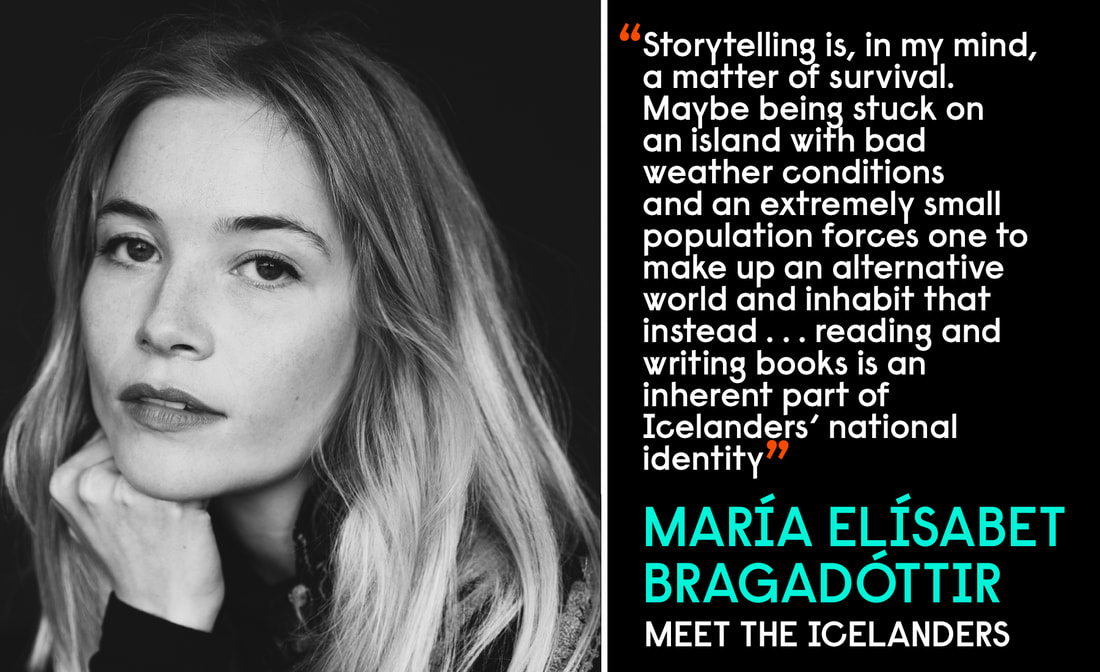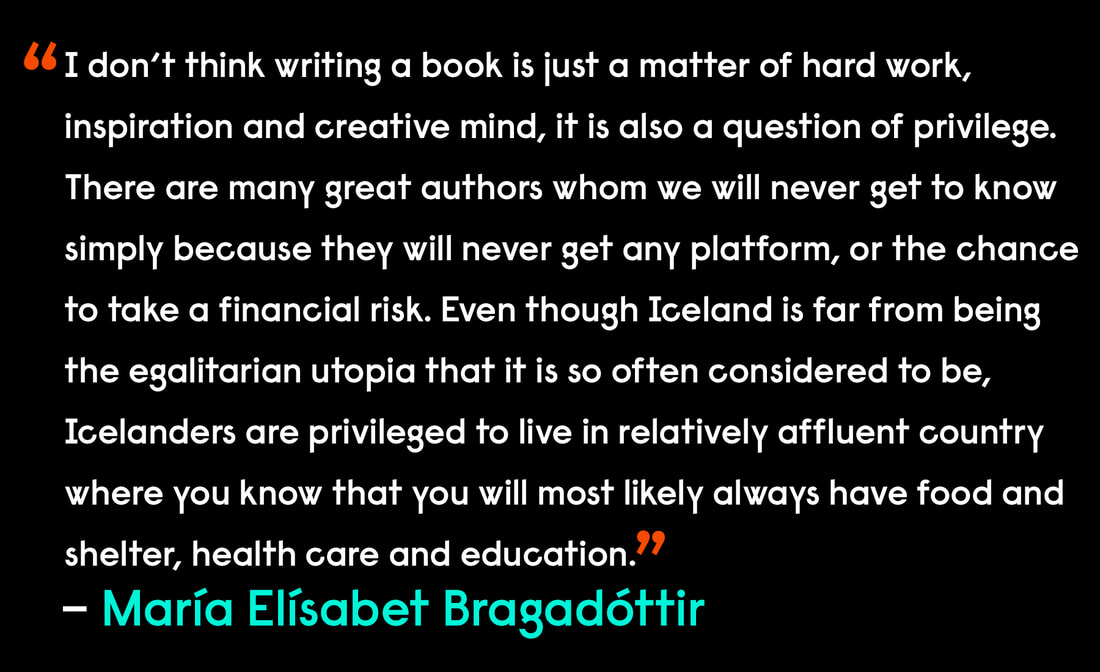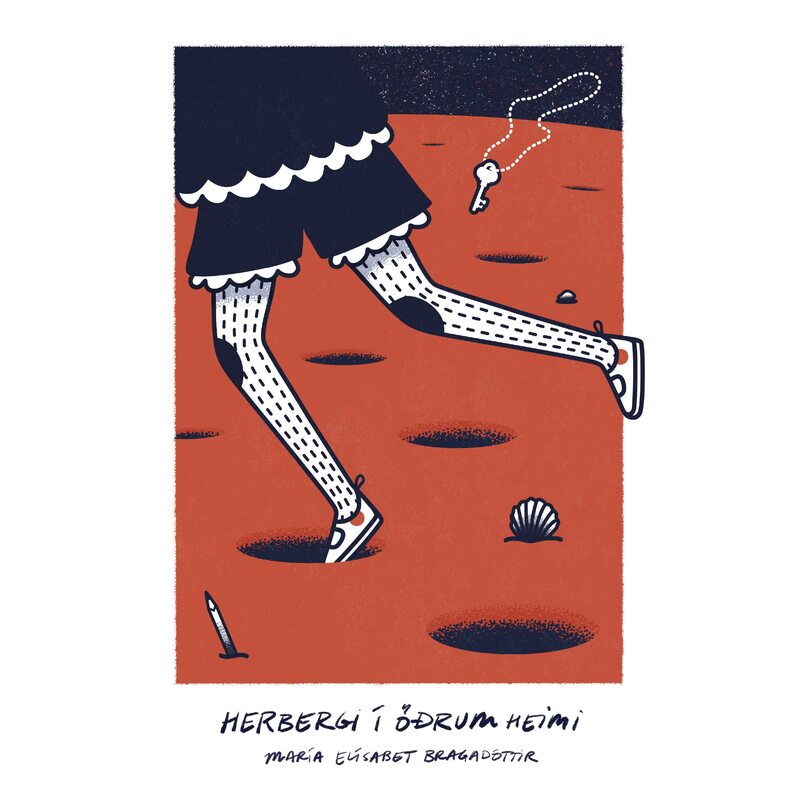|
Welcome to the third interview in our blog series 'Meet the Icelanders'. This week we spoke to one of the most exciting Icelandic writers to have appeared on the literary scene over the last few years, María Elísabet Bragadóttir. María will be appearing at Iceland Noir for the second time this year and although her work has not yet been published in English, we very much hope that it soon will be as it is so universal in its appeal. María's first book is the short story collection, Herbergi í öðrum heimi (A Room in Another World), was published in Iceland in 2020 to huge critical and popular acclaim with readers of all ages captured by her unique writing style and immersive storytelling. She is currently working on her second book, a novel. Hello María Elísabet! Please tell us a little bit about yourself. I am an Icelandic writer living in downtown Reykjavík where I grew-up. My first book Herbergi í öðrum heimi (A Room in Another World) was published in 2020. I am a graduate in philosophy from the University of Iceland. I always wanted to do something creative but felt like going to art school was too risky. For some time I had been thinking of philosophy and after hearing someone say that studying philosophy meant spending days reading very slowly, it stuck with me. So I signed-up for it and it turned out to be a good decision which has benefitted my writing. When I was 21 I got lucky when someone referred me to the editor of a daily newspaper who offered me the chance to write a regular column after seeing my posts on Twitter. It was a huge stepping stone having my thoughts published for a national audience and to have a deadline for something creative every other week. I was a bookish kid and I still think of myself first and foremost as a reader and subsequently as a writer. I wanted to become a writer from an early age, but also to be a painter and an actress and now I can see how it all derives from the same instinct. It means using one‘s imagination to make up characters, put them on a stage and give them a voice, let them talk to one another – it is like drawing pictures with words, deciding on details, the colour scheme, the atmosphere and the frame. I was lucky enough to have grown-ups around me that took my aspirations seriously and had genuine interest in my stories, so I always felt like I had something of great importance to bring to the table. It has always been my impulse to write, and I have been driven by this notion that if I don't write about it, someone might decide that it does not matter. Your first collection of short stories, Herbergi í öðrum heimi (A Room in Another World), has been a huge success in Iceland and received rave reviews. Can you tell English readers a bit about it? The short story is one of my favourite mediums. I love reading short stories and I like the challenge it brings for a writer, to only have a few pages to satisfy the readers‘ longing for an interesting story. I like it when short stories do not resolve but rather impose something, when they are suggestive. I think it is difficult to wrap the contents of the book up in a few words since it is a collection of stories and not a novel, but if there is any "thread" throughout the book it might be relationships, and the desire of most individuals for intimacy and a sense of belonging. My characters are mainly young people in Reykjavík. Some of the stories revolve around the notion of the self and self-perception; the partly false narrative we often construct for ourselves. I also like writing from a child's perspective. There are two stories in the collection about children, reflecting on the thin line between innocence and cruelty and examining the gap between children and adults. I loved writing my debut. I had so much fun typing on my ancient laptop (even though it crashed a few times, which was terrifying) and I hope it reads that way as well. The book was great company for me when it was still just a Word document. Iceland is famous for its literary culture. What do you think it is about living in Iceland that brings out so much creativity? A few things come to my mind . . . Storytelling is, in my mind, a matter of survival. Maybe being stuck on an island with bad weather conditions and an extremely small population forces one to make up an alternative world and inhabit that instead. It is true however that reading and writing books is an inherent part of Icelanders‘ national identity. "The Christmas Book Flood" (Jólabókaflóðið) is a long-standing tradition of buying books for gifts for Christmas. It might sound like something invented for public relations purposes just a few years ago, but it is not. Christmas in Iceland is all about books for many people. The social safety net most Icelanders have in their lives is worth mentioning as well. I don‘t think writing a book is just a matter of hard work, inspiration and creative mind, it is also a question of privilege. There are many great authors whom we will never get to know simply because they will never get any platform, or the chance to take a financial risk. Even though Iceland is far from being the egalitarian utopia that it is so often considered to be, Icelanders are privileged to live in relatively affluent country where you know that you will most likely always have food and shelter, health care and education. What are you working on at the moment? I always have a few literary projects that I am working on simultaneously, I find it often helps. The moment I get sick of living inside one story, I open another document which can be energising and inspiring. Also I find it important for the editing process, to put something aside and let time pass before picking it up again even though I am often eager to finish it. It is necessary to distance yourself from the prose to gain perspective. One of the things I find difficult with writing is the need to be patient, I am an impatient person. Currently I am working on a novel but I also have a few other projects going on. This eases my mind. Who are you most looking forward to seeing at the festival? I have attended the festival once before (2021) and it was amazing. Everyone was super-friendly and the atmosphere was laid back but people were also bursting with the need for face to face interaction after almost two years of social distancing. What I love the most about Iceland Noir is the diversity of the festival. The line-up this year (2022) is great. I am so excited to see both Bernardine Evaristo and of course the living legend, Marian Keyes. I am also looking forward to seeing familiar Icelandic faces, and getting to know authors I don‘t know anything about yet. If our visitors do one thing in Reykjavík, what should that be? Go to the pool. It is the absolute best thing about living in Iceland. Forget about the Blue Lagoon. Doesn't matter if there is snow blizzard or a hail storm. Just go to the nearest public swimming pool and sit down in a hot tub. The best part is of course that you are not allowed to bring your phone with you so people are forced to stay with their thoughts (people like me, with severe phone addiction, need to do this). I go to the pool nearly everyday and I prefer to go alone. It is good for your mental health and personally I find that it often helps with writers block. Even better than a long walk, in my opinion. See María at Iceland Noir 2022. Last few tickets on sale HERE.
0 Comments
Leave a Reply. |





 RSS Feed
RSS Feed
